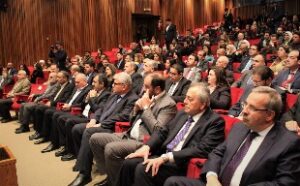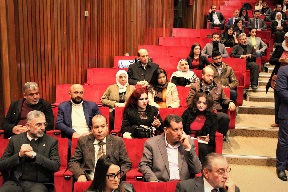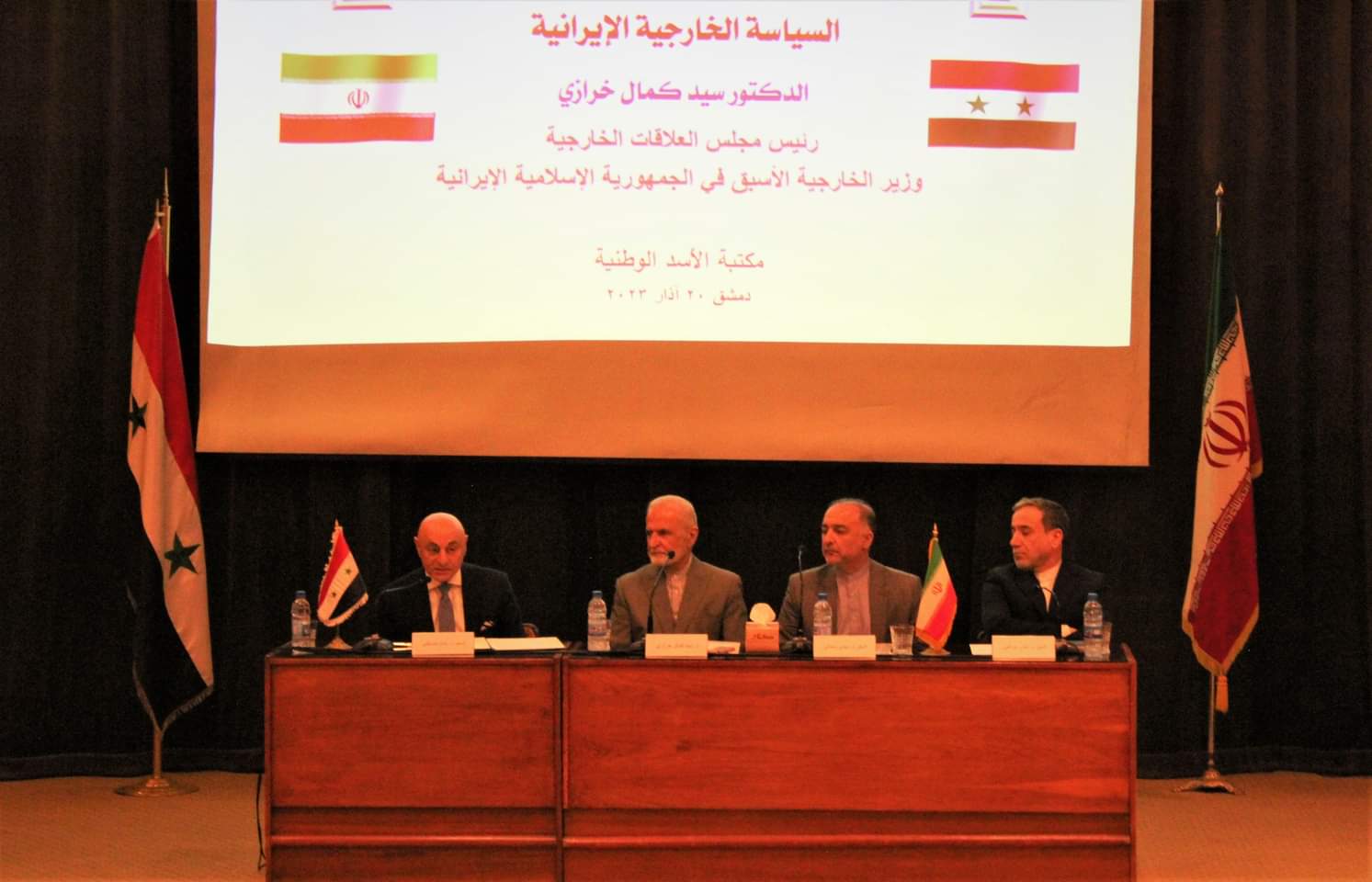Kamal Kharrazi : “Policy of Resistance” is behind the hostility of the West and the Zionist regime towards countries that reject submission to big powers
Former Iranian Foreign Minister and the head of Iran’s Strategic Council on Foreign Relations, Kamal Kharrazi, gave on Monday a lecture entitled the “Iranian Foreign Policy” at the Al-Assad Library in Damascus in the presence of many diplomats, intellectuals, clergymen and students from the faculty of political sciences.
Kharrazi said that there is a particular proven fact indicating that throughout the history of international relations-and especially in the contemporary era- the position of countries in any order is based on their strength, capabilities and resistance to the pressures of other powers.
“This fact is the same experience has been pursued under the title of “Policy of Resistance” by Iran and Syria during the last half century, especially in the last decade,” he added, pointing out that this policy is behind the hostility of the West, the Zionist regime and the regional countries that prefer the policy of submission to big powers.
“The joint experience of Iran and Syria shows that the most determining factor of power in today’s world is the ability to resist the domineering system, stand against the bullying policies of big powers, and be ready to pay the price.. The secret of our strength is our resilience and resistance. And it will continue in the future,” the diplomat asserted.
He referred to the fact that in the recent decades the U.S. has launched or joined destructive wars under the pretext of fighting terrorism in this large region, which led to the killing of millions of innocent people, the displacement of tens of millions of people, the breakup of communities and families, the collapse of government and the escalation of violent extremism.
 ” Every country that America has attacked under the pretext of establishing democracy or expanding freedom, or every coup and rebellion the U.S. has orchestrated has failed to fulfill the claimed goals. The U.S. interventions in Iran, Afghanistan, Iraq, Egypt and Syria are examples of this aggression. The reason behind America’s successive failures are its lack of knowledge of the Middle East and the native culture and religious beliefs of the people, its ignorance of the people’s ability to resist the aggression of foreigners, the growth of the awareness of nations after the Islamic revolution and the formation of a resistance front against the Israeli apartheid regime and its support for the oppressed nations of the region.
” Every country that America has attacked under the pretext of establishing democracy or expanding freedom, or every coup and rebellion the U.S. has orchestrated has failed to fulfill the claimed goals. The U.S. interventions in Iran, Afghanistan, Iraq, Egypt and Syria are examples of this aggression. The reason behind America’s successive failures are its lack of knowledge of the Middle East and the native culture and religious beliefs of the people, its ignorance of the people’s ability to resist the aggression of foreigners, the growth of the awareness of nations after the Islamic revolution and the formation of a resistance front against the Israeli apartheid regime and its support for the oppressed nations of the region.
Kharrazi quoted some points from a new book written by Philip Gordon, the White House Coordinator for Middle East Affairs during Barack Obama Presidency, under the title “ Losing the Long Game: The False Promise of Regime Change in the Middle East”.
The first quote says: “ Analysts and experts of Syrian Affairs in all sectors of the American government agreed that the Syrian opposition front would overthrow President Bashar Al-Assad within 4 or 6 months. including Frederick Hoff [Senior member of the Atlantic Council], who said: “ The prevailing belief was that Assad would not last long. The Arab spring toppled Mubarak and others ; all of them were giants; Who was Assad to be able to resist the power of this wave?” The then US National Security Adviser Condoleezza Rice said: “We will arm and train the experienced Syrian rebels, who are fighting Assad”.
The second quote shows that after the failure of the efforts to strengthen Assad’s opponents, Obama approved a $5 billion anti-terrorist cooperation budget in May 2014 to strengthen Syria’s neighbors. He suggested that $500 million will be spent on training and equipping the opponents under the supervision of the US Defense Department.
While the third quote is connected with what Joe Biden said in his speech on October, 3,2014 at Harvest University. “ They are determined to bring down Assad, and practically start a Shia-Sunni proxy war in a way that anyone willing to fight Assad (including Al-Nusra, Al-Qaeda and Jihadist extremist elements) received hundreds of millions of dollars and tens of thousands of weapons.
“Philip Gordon’s quotes reveal the ignorance of the American authorities about the culture of the Middle East people, who stand up against the foreigners’ aggression and prefer martyrdom to the shame of living under foreigners’ rule,” Kharrazi stressed.
He affirmed that his country has chosen the path of confronting the dominance of the superpowers to stabilize its power. Thus, “resistance-based” diplomacy forms the basis of the foreign policy of Iran.
“One of the most important goals of this diplomacy, in parallel with scientific development and economic progress, is the promotion of national security and defensive deterrence. Security is not a commodity that can be bought. The Islamic Republic of Iran has not repeated the mistakes of many countries in the region related to depending on foreign powers for their security. Security must emerge from internal capabilities and facilities; otherwise it will not be sustainable. For this reason, Iran is against the presence of the influence of any foreign power in the West Asia region and it has a deep belief that the region can become strong and can enjoy peace with the cooperation of all countries and without foreign interference,” Kharrazi clarified.
 Concerning the Iranian- Saudi relations, the Iranian diplomat said that his country considers Saudi Arabia as a large country in the region and influential in the Islamic World.
Concerning the Iranian- Saudi relations, the Iranian diplomat said that his country considers Saudi Arabia as a large country in the region and influential in the Islamic World.
“Iran and Saudi Arabia can not exclude each other. As the region’s two main powers, they use each other’s capabilities to ensure peace and stability and the region’s development. Fortunately, the two countries recently agreed to resume bilateral relations thanks to the efforts exerted by Iraqi and Omani governments and the recent initiative launched by the Chinese government… We believe that the best way to solve the security mystery in the West Asia and the Persian Gulf region is to open dialogue between the countries of the region without the presence and the interference of foreign powers,” Kharrazi said.
He indicates that the Yemeni crisis is still one of the most important concerns of the region.
“ Since the start of this crisis, Iran has declared that there is no military solution to this crisis, a fact that everyone , including those who initiated this crisis, now realize 9 years after the war and destruction,” the diplomat said.
He in addition affirmed that Iran supports the formation of solid and capable government in Lebanon, citing that secure Lebanon with a strong economy could play a constructive role in the region.
As for the situation in the occupied Palestine, Kharrazi said that the appearance of ulta-extremist individuals and parties in the Israeli government poses additional threat to the life of the Palestinian people.
He underscored that the Zionist regime has no goal but to create tension in the region.
The Iranian diplomat concluded his lecture by emphasizing his country’s principled position towards Syria, regretting that some countries in the region were involved in supporting Takfiri and terrorist groups to serve the Israeli regime. “Some of these countries are trying today to correct their mistakes and restore their diplomatic ties with Syria, which means their admission of their wrong past policies. These countries must know that they still have a long way to go before gaining the trust and confidences of the Syrian people.”
Reported by: Basma Qaddour

